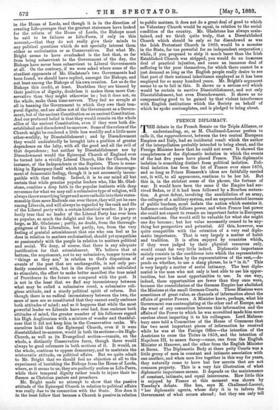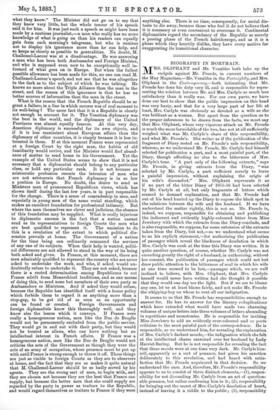FRENCH DIPLOMACY.
THE debate in the French Senate on the Triple Alliance, or understanding, or, as M. Challemel-Lacour prefers to calls it, the rapprochement, between the two central European Empires and Italy, had an incidental result which the author of the interpellation probably intended to bring about, and the Foreign Minister knew that he could not avert. It showed the completeness of the diplomatic isolation in which the events of the last five years have placed France. This diplomatic isolation is something distinct from political isolation. Poli-
tical isolation has been the lot of France ever since 1870, and so long as Prince Bismarck's ideas are faithfully carried out, it will, to all appearance, continue to be her lot. But this is, in the strictest sense of the phrase, the fortune of war. It would have been the same if the Empire had sur- vived Sedan, or if it had been followed by a Bourbon restora- tion. A great defeat, involving the annihilation of an army, the collapse of a military system, and an unprecedented increase of public burdens, must isolate the nation which sustains it.
Influence ordinarily follows power, and when France lost power she could not expect to remain an important factor in European combinations. She would still be valuable for what she might one day become ; but her value necessarily ceased to be any- thing but prospective and potential. All this, however, was quite compatible with the retention of a very real diplo- matic importance. That is very largely a matter of habit and tradition. It is often enjoyed by countries which, if they were judged by their physical resources only, would count for very little indeed. Diplomatic importance mainly consists in the confidence into which the representative of one power is taken by the representatives of the rest,—de- pends on whether, to use a slang phrase, he is "in it." This is very largely a matter of social intimacy. The best diplo- matist is the man who not only is best able to use his oppor- tunities, but has most opportunities to use. In one way, indeed, these opportunities are fewer than they once were, because the consolidation of the German Empire has abolished the Missions at the small German Courts. These Missions were sometimes of great value, as channels of information about the affairs of greater Powers. A Minister knew, perhaps, what his Government was contemplating at the other end of Europe, and the want of any connection between this information and the affairs of the Power to which he was accredited made him more careless about imparting it to his colleagues. Lord Malmes- bury once told a Committee of the House of Commons that the two most important pieces of information he received while he was at the Foreign Office—the intention of the Austrians to cross the Ticino in 1859, and the intention of Napoleon III. to annex Savoy—came, one from the English Minister at Hanover, and the other from the English Minister at Berne. The Diplomatic Body at these petty Courts was a little group of men in constant and intimate association with one another, and when men live together in this way for years, they naturally come to have but few secrets that are not common property. This is a very fair illustration of what diplomatic importance means. It depends on the maintenance of constant, intimate, and equal intercourse. How little this is enjoyed by France at this moment was shown by Tuesday's debate. She has, says M. Challemel-Lacour, "her diplomatic agents, whose duty it is to inform the Government of what occurs abroad ; but they can only tell
what they know.' The Minister did not go on to say that they knew very little, but the whole tenour of his speech said it for him. It was just such a speech as might have been made by a cautious journalist,—a man who really has no more knowledge of what is going on than his readers can equally gam from each morning's telegrams, but who is anxious not to display his ignorance more than he can help, and so keeps as closely as possible to generalities. No doubt, M. Challemel-Lacour was at a disadvantage. He was answering a man who has been both Ambassador and Foreign Minister, and who is supposed even now to be exceptionally well in- formed of what goes on in Europe. But when the fullest possible allowance has been made for this, no one can read M. Challemel-Lacour's speech and not see that he was altogether in the dark as to the subject of which he was talking. He knows no more about the Triple Alliance than the man in the street, and the reason of this ignorance is that he has no better sources of information than the man in the street.
What is the reason that the French Republic should be so great a failure, in a line in which success was of real moment to its well-being? The mere fact that it is a Republic is clearly not enough to. account for it. The Venetian diplomacy was the best in the world, and the diplomacy of the United Provinces was almost equally famous. At this very day, American diplomacy is successful for its own objects, and if it is less omniscient about European affairs than the diplomacy of other countries, it is simply because it is less in- terested in them. If at this moment France were represented at a foreign Court by the right man, the habits of old familiarity would revive, and the Minister would find abund- ance of matter to send home to his Government. Yet the example of the United States seems to show that it is not necessary that a diplomatist should belong to any particular class, or hold any particular rank. It is not because an aristocratic profession resents the intrusion of men who are not aristocrats that French diplomacy is in so low a position in Europe. No doubt, the desire to send as Ministers men of pronounced Republican views, which has shown itself during the last few years, is in part responsible for the change. There is a sense of comradeship in men, and especially in young men of the same social standing, which makes an excellent foundation for professional intimacy. But where the men themselves are clever and judicious, the absence of this foundation may be supplied. What is really injurious to diplomatic success is the fact that a nation cannot send as its representatives to foreign Courts the men who
are best qualified to represent it. The omission to do this is a revelation of the extent to which political dis- sension prevails at home. The Government of a nation for the time being can ordinarily command the services of any one of its subjects. When their help is wanted, politi- cal differences are not allowed to stand in the way of its being both asked and given. In France, at this moment, there are men admirably qualified to represent the country who are never asked to undertake the work, and who, if asked, would un- doubtedly refuse to undertake it. They are not asked, because there is a rooted determination among Republicans to cut France adrift from Monarchical traditions, and as one means of doing this, to send none but members of their own party as Ambassadors or Ministers. And if asked they would refuse, because the Republic has identified itself with a home policy which forbids them to regard it as anything more than a stop-gap, to be got rid of as soon as an opportunity
can be found or created. Foreign Governments and foreign diplomatists know this thoroughly well, and they know also the lesson which it conveys. If France were really a homogeneous nation, men like the Due de Broglie would not be permanently excluded from the public service. They would go in and out with their party, but they would not be treated as aliens, who can have nothing but an intellectual interest in French affairs. If France was a homogeneous nation, men like the Duc de Broglie would not criticise the acts of the Government as though they were the acts of an army of occupation, whose presence must be put up with until France is strong enough to throw it off. These things are just as visible to foreign Courts as they are to observers at home, and the fact that they are so makes it quite natural that M. Challemel-Lacour should be so badly served by his agents. They are the wrong sort of men, to begin with, and they are chosen not because they are the best that France can supply, but because the better men that she could supply are regarded by the party in power as traitors to the Republic, and would regard themselves as traitors to France if they were anything else. There is no time, consequently, for social dis- taste to die away, because those who feel it do not believe that it is necessary or even convenient to overcome it. Continental diplomatists regard the ascendancy of the Republic as merely a passing phase of the French kaleidoscope, and as it is a phase which they heartily dislike, they have every motive for exaggerating its transitional character.



































 Previous page
Previous page